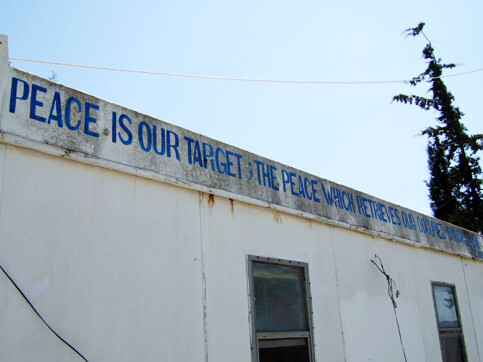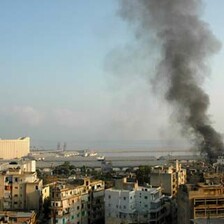The Electronic Intifada 4 June 2008

On the Syrian outpost at the Syria-Israel armistice line in the Golan Heights, it reads: “Peace is our target; the peace which retrieves our Occupied Syrian Golan.” (Josh Hough)
It may be too early to determine what truly lies behind the secret Syria-Israel “peace talks.” With Israeli Prime Minister Ehud Olmert positioned to leave office under a cloud of scandal and after a rash of policy failures across the Middle East, the Bush Administration is now counting its last days in power. Thus, it appears that the Syrian government has chosen an opportune time to attempt to usher in a new positive period for itself. Whatever the intentions of the parties involved in these negotiations, at least one thing can be said that makes them irrelevant. That is, for those of us working for justice in Palestine, to position ourselves as either “for” or “against” these so-called “peace talks” is to obscure other important questions about, and facets of, the relationship between Syria and Israel, as well as the other implications of this ever-enduring “process.”
Time and again, it has been re-affirmed that these negotiations for “peace” have always been to the overwhelming advantage of one party, and to the disadvantage of the others. That is not to say that peace is undesirable, or that open and transparent communication should be rejected, but rather that this process does not bring peace as we might normally imagine it or as its proponents have claimed. Nor is it open or transparent. The Palestinians know this lesson more than any other participant in the “peace process” as they have watched the seemingly endless talks with Israel continue to weaken their struggle. If accepting “peace” were simply a matter of abhorring violence, then the term would not be separate from “cease-fire.” How else can Israel’s perpetual calls for “peace” but constant rejections of cease-fire proposals from Palestinians be explained or understood?
The question that is posed to us by these talks, after all, is not whether we believe in “peace,” but whether we believe that colonization can be peaceable, or that liberation must be peaceful. A rejection of “peace talks” is not a rejection of peace, peaceful processes, diplomacy, or resolutions, but the rejection of the normalization of the status quo, since that is what these talks will affirm. It is worth noting that in the Syrian context, that there has been no open warfare for 40 years, that the only aggression has been instigated by Israel, and thus that there is no obvious pressing military need for such talks.
There is yet another facet of these talks to be examined. We tend to consider only their outcome as being potentially normalizing, when in fact it is the process itself that is normalizing since the very framework legitimizes occupation and colonization as things to be “negotiated” or “discussed” rather than rejected. Further, even without any formal results, these normalizing talks have always been fruitful for Israel which, behind this veneer of an ultimate aspiration for peace, continues to engage in violent hostilities and offenses against all parties with whom it has ever engaged in a peace process because it can then position the oppressed, colonized, and occupied as the obstacle to peace, as opposed to its own continued intransigence. Under a desire for future peace, Israel today expands settlement and annexation while expanding its military. It has only been a few months since Israeli airplanes bombed Syria, and it has been probably only a matter of minutes since the last Palestinian was abused, injured, detained, tortured or killed by Israeli violence, despite the unwavering — and ultimately meaningless — public relations claim that Israel “wants” peace. In this Israel has been aided by the incompetence of those who speak for and represent the occupied that has allowed for the discursive inversion of the relationship between the occupied and the occupier, insofar as responsibilities and rights are concerned.
Neither we nor those parties presuming to speak in our name should ever accept that these are “peace talks.” They are talks that normalize occupation. At best, communication between the occupied and the occupier can be a way to guide the disengagement and decolonization of occupied lands and peoples. If “talks” do not have this effect (and the only time they ever have was when parties were of equal not disparate strength like Egypt after the 1973 war), then they achieve quite the opposite. Nor is the Israeli government the only entity which is normalized through such processes: so is the Syrian government. In both cases, there are collective interests guiding participation in the process that are not necessarily the interests of the peoples for whom they purport to represent. Namely, the interests of that collectivity called “the government” and its own survival. These talks and the idea of “peace agreements” have meaning primarily and most directly for state and government institutions, not people. Hence Olmert in the final days of his government grasps for a rope that might pull him out of his quickly deepening hole, while Syria finds talks as an opportunity to strengthen its image and position in the region following years of threats and isolation.
We should recall, too, what has been the outcome of all previous “peace talks” that brought no peace: much publicized “failures,” as if it were the fault of both the occupier and the occupied for failing to bring “peace.” We are still haunted by the fact that the late Syrian president Hafez al-Assad and Syria continue to be blamed for Ehud Barak’s refusal to return the occupied Golan Heights. In truth, the only party who can “fail” to bring peace is the occupier, because the occupier is the cause of its absence. The occupied, on the other hand, cannot be blamed for a lack of peace because their status as “occupied” leaves them inherently in a position of conflict. If anything, the occupied can be blamed only for failing to bring peace by failing to bring liberation, for weakening the struggle by normalizing occupation and colonization through such futile “talks.” Hizballah never sat at a table in a lavish hotel with any Israeli prime minister while southern Lebanon was occupied. To speak of a “peace process” between Syria and Israel, or between Palestine and Israel, precludes the possibility that one or more of these entities is itself a barrier to peace. We should not be ashamed by such an acknowledgment because we should never forget that it is not the place of the colonized or the occupied to embrace “peace,” but rather the responsibility of the colonizing occupier to reject “war.”
In the case, though, that this process achieves its formal goal of normalization, this will merely shift the task of the activist away from arguing against normalization, since it has already occurred, to calling for boycott — economic and otherwise — of a state that is premised on persistent dispossession and displacement. The pattern to be followed in solidarity with the Palestinians in Syria, will begin to resemble the pattern guiding solidarity movements in the West and those in Egypt and Jordan. Grassroots boycott is the feature of a political institution’s failure to represent, through formal channels, the desire of its people. And that, really, is the more accurate expression of where we stand on so-called peace talks between Syria and Israel, or Palestine and Israel: not in a position that advocates war or interminable violence or is against “peace,” but in a position that calls for boycott until justice. As we have come to know them “peace talks” are simply incompatible with such a position, especially in a country that is home to half a million Palestinian refugees and yet has not named the refugees’ right of return as one of its concerns in the bilateral process. “Peace talks,” now, are nothing more than the next manufactured product whose consumption benefits the manufacturer, the occupier, and by that reason alone calls for boycott.
Yaman Salahi is an undergraduate student at UC Berkeley and a member of Students for Justice in Palestine.





